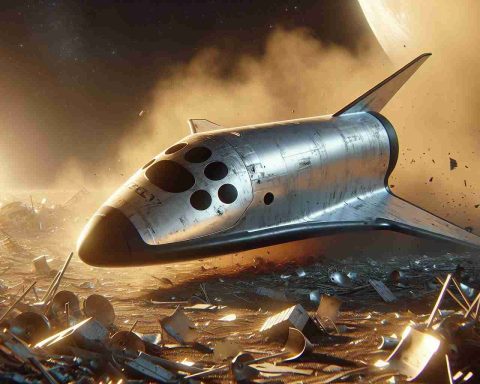A Historic Achievement in Rocket Engineering
The Indian Space Research Organisation (ISRO) has reached an impressive milestone, successfully restarting its Vikas liquid engine during a key test at the ISRO Propulsion Complex in Mahendragiri, Tamil Nadu. This powerful engine has been pivotal in ISRO’s launch vehicles and is currently undergoing enhancements to pave the way for groundbreaking reusable launch vehicle technology.
In a remarkable demonstration, the engine was ignited for 60 seconds, allowed to shut down for 120 seconds, and then restarted seamlessly for an additional seven seconds. This successful performance has been confirmed as meeting all expected parameters.
This test marks the second showcase of the Vikas engine’s restart capabilities; a previous shorter test occurred in December 2024, which involved a 42-second shut-off followed by a brief seven-second firing.
ISRO is committed to advancing the Vikas engine’s efficiency, planning additional experiments to refine its performance across various restart conditions. This progress is a significant step toward achieving fully reusable launch vehicle advancements, which could revolutionize space missions and reduce costs in the future. As ISRO continues to innovate and enhance their technologies, the world watches closely, anticipating the next golden era of space exploration.
The Future of Space Exploration: Economic and Environmental Implications
The development of efficient, reusable rocket technology by the Indian Space Research Organisation (ISRO) embodies a transformative shift not only in engineering but also in broader societal and economic contexts. The potential impact on the global economy is profound. A reusable launch vehicle could drastically reduce costs associated with sending payloads into orbit, thereby democratizing access to space. As space becomes more accessible, we may witness a surge in private sector involvement and innovation, leading to a new era of commercial spaceflight and satellite deployment.
Moreover, the societal implications cannot be overlooked. As nations invest in space technology, a global marketplace for innovation and collaboration may emerge, reshaping international relationships and fostering peaceful uses of space. Educational and employment opportunities in high-tech sectors could expand, inspiring the next generation of engineers and scientists.
On an environmental front, the move towards reusable technology signifies a critical shift towards sustainability in aerospace. Launching rockets traditionally generates significant carbon emissions, but enhanced reusability could expedite a transition to greener alternatives, potentially paving the way for technologies that minimize environmental impact further.
As we look to the future, trends indicate a growing interest in sustainable and cost-effective space solutions. The successes demonstrated by ISRO could serve as a catalyst for innovation across the globe, bringing us closer to the stars while challenging us to preserve our own planet. The significance of these developments extends far beyond the launchpad, promising to reshape our approach to technology, economy, and environmental stewardship.
ISRO’s Milestone: The Future of Reusable Rocket Technology Unveiled
A Historic Achievement in Rocket Engineering
The Indian Space Research Organisation (ISRO) has made significant strides in rocket technology with the successful restart of its Vikas liquid engine during a recent test at the ISRO Propulsion Complex in Mahendragiri, Tamil Nadu. This achievement is not just a testament to ISRO’s engineering capabilities but also a critical step toward developing reusable launch vehicle technology that could transform future space missions.
Specifications of the Vikas Engine
The Vikas engine, which has powered several of ISRO’s launch vehicles, is known for its reliability and efficiency. It operates on hypergolic propellants, which ignite spontaneously upon contact, a feature that enhances its overall performance and safety. The recent test involved a remarkable sequence:
– Initial Ignition: The engine was ignited for 60 seconds.
– Shutdown Phase: It was then shut down for 120 seconds.
– Restart: Finally, the engine was restarted for an additional seven seconds.
All of these operations met the anticipated performance parameters, showcasing the engine’s sophisticated restart capabilities.
Pros and Cons of ISRO’s Approach
Pros:
– Cost Reduction: By developing reusable launch technology, ISRO aims to significantly lower the cost of accessing space.
– Increased Launch Frequency: Reusable vehicles can lead to more frequent launches, facilitating more experiments and payload deliveries.
– Innovation in Space Technology: These advancements position India as a key player in the global space technology arena.
Cons:
– Development Costs: Initial investment in developing reusable technologies could be high.
– Technical Challenges: Ensuring reliability in reusable systems poses significant technical hurdles that must be overcome.
Use Cases of Reusable Launch Vehicles
ISRO’s commitment to enhancing the Vikas engine may open a variety of use cases:
1. Satellite Deployment: More efficient and cost-effective deployment of satellites into various orbits.
2. Interplanetary Missions: Facilitating more ambitious missions to destinations like Mars or the Moon.
3. International Collaborations: Partnering with other space agencies for shared missions and technology exchange.
Market Trends and Insights
The global space economy is rapidly evolving, with a marked shift towards reusable launch systems. Companies like SpaceX have already revolutionized the industry, and ISRO’s efforts could position India as a competitive player. As countries seek to lower the costs of access to space, innovations like those seen with the Vikas engine could lead to a new era of space exploration.
Innovations on the Horizon
ISRO is currently planning more rigorous tests to enhance the Vikas engine’s performance under varying conditions, indicating a robust commitment to innovation. This includes experimenting with different propellant combinations and operational scenarios to ensure optimal performance.
Security and Sustainability Aspects
With the rising interest in space exploration, ISRO is focused on sustainability. The development of reusable launch vehicles is not only about cost but also about reducing the environmental impact associated with rocket launches. By maximizing the use of each vehicle, ISRO aims to lessen the waste typically associated with single-use launch systems.
Conclusion
The successful testing of the Vikas engine serves as a pivotal moment in ISRO’s history and could redefine space travel in the coming years. As technology advances and ISRO continues to push the boundaries of what’s possible, the future of space exploration looks bright.
For more information on ISRO and its pioneering projects, visit ISRO.















